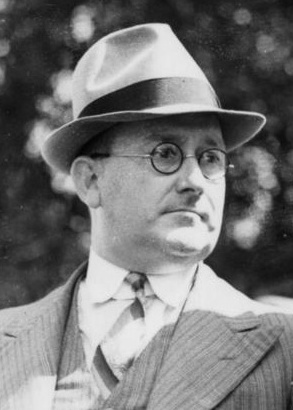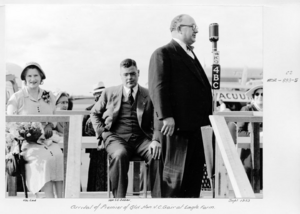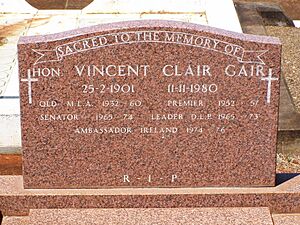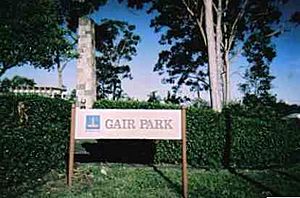Vince Gair facts for kids
Quick facts for kids
Vince Gair
|
|||||||||||||||||||||||||||||||
|---|---|---|---|---|---|---|---|---|---|---|---|---|---|---|---|---|---|---|---|---|---|---|---|---|---|---|---|---|---|---|---|
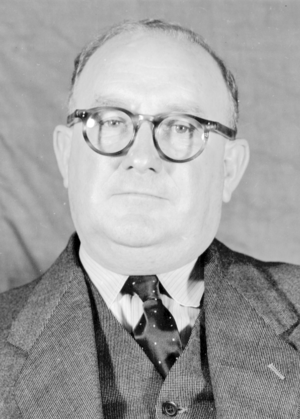
Gair in 1953
|
|||||||||||||||||||||||||||||||
| 27th Premier of Queensland | |||||||||||||||||||||||||||||||
| In office 15 January 1952 – 12 August 1957 Acting: 15 January – 23 January 1952 |
|||||||||||||||||||||||||||||||
| Monarch | George VI Elizabeth II |
||||||||||||||||||||||||||||||
| Governor | John Lavarack | ||||||||||||||||||||||||||||||
| Deputy | Tom Foley Jack Duggan Ted Walsh |
||||||||||||||||||||||||||||||
| Preceded by | Ned Hanlon | ||||||||||||||||||||||||||||||
| Succeeded by | Frank Nicklin | ||||||||||||||||||||||||||||||
| Deputy Premier of Queensland | |||||||||||||||||||||||||||||||
| In office 15 May 1947 – 17 January 1952 |
|||||||||||||||||||||||||||||||
| Premier | Ned Hanlon | ||||||||||||||||||||||||||||||
| Preceded by | Ted Walsh | ||||||||||||||||||||||||||||||
| Succeeded by | Tom Foley | ||||||||||||||||||||||||||||||
| Treasurer of Queensland | |||||||||||||||||||||||||||||||
| In office 10 May 1950 – 17 January 1952 |
|||||||||||||||||||||||||||||||
| Premier | Ned Hanlon | ||||||||||||||||||||||||||||||
| Preceded by | James Larcombe | ||||||||||||||||||||||||||||||
| Succeeded by | Ted Walsh | ||||||||||||||||||||||||||||||
| Member of the Legislative Assembly for South Brisbane |
|||||||||||||||||||||||||||||||
| In office 11 June 1932 – 28 May 1960 |
|||||||||||||||||||||||||||||||
| Preceded by | Neil MacGroarty | ||||||||||||||||||||||||||||||
| Succeeded by | Col Bennett | ||||||||||||||||||||||||||||||
|
|||||||||||||||||||||||||||||||
| Personal details | |||||||||||||||||||||||||||||||
| Born |
Vincent Clair Gair
25 February 1901 Rockhampton, Queensland, Australia |
||||||||||||||||||||||||||||||
| Died | 11 November 1980 (aged 79) South Brisbane, Queensland, Australia |
||||||||||||||||||||||||||||||
| Resting place | Nudgee Cemetery | ||||||||||||||||||||||||||||||
| Political party | Labor | ||||||||||||||||||||||||||||||
| Other political affiliations |
|
||||||||||||||||||||||||||||||
| Spouses | Florence Glynn (1924–1929; her death) Ellen Sexton (1944–1980; his death) |
||||||||||||||||||||||||||||||
| Occupation | Public servant, Ambassador | ||||||||||||||||||||||||||||||
Vincent Clair Gair (born February 25, 1901 – died November 11, 1980) was an important Australian politician. He served as the Premier of Queensland from 1952 to 1957. During his time as Premier, he had disagreements with trade unions. These issues led to him being removed from the Labor Party. Later, he was elected to the Australian Senate and became the leader of the Democratic Labor Party from 1965 to 1973. In 1974, he was appointed as the Australian Ambassador to Ireland. This appointment caused him to be removed from the Democratic Labor Party.
Contents
Early Life and Family
Vince Gair was born in Rockhampton, Queensland, Australia. His parents, John Alexander and Catherine Mary Gair, were from Scotland and Ireland. He was raised in the Catholic faith. His parents were among the first members of the Labor Party in Queensland in the 1890s.
When his family moved to Dutton Park, Queensland, he started working for the Department of Railways. In 1916, he joined the Labor Party. He married Florence Glynn in 1924, but she sadly died in an accident five years later. Gair's only daughter from his first marriage also passed away in 1941. In 1944, he married Ellen Mary Sexton, and they had two sons together.
State Political Career
Gair became a member of the Queensland Legislative Assembly for the area of South Brisbane. He worked hard to keep his position in this area. He was mostly successful, except for a challenge in the 1938 election. He won that election and continued his work in Parliament.
For ten years, Gair was a regular member of Parliament. In 1942, he was appointed as the Secretary for Mines. The same year, he became the Minister for Labour and Employment. In 1947, his fellow politicians chose him to be the Deputy Premier. By 1950, he also took on the role of Treasurer.
Many Labor politicians in Queensland were closely connected to the Australian Workers' Union (AWU). However, Premier Edward Hanlon was not directly linked to the AWU. This helped reduce the union's political power.
In 1948, groups were formed within the Labor Party to challenge the influence of the Communist Party of Australia in trade unions. Gair supported these groups, hoping to strengthen his position within the party. However, when conflicts arose, the AWU changed its support and these groups were disbanded. This later meant Gair lost some support within the party. When Premier Hanlon passed away in January 1952, Gair was chosen by the Labor Party to become the new Premier.
Leading Queensland as Premier
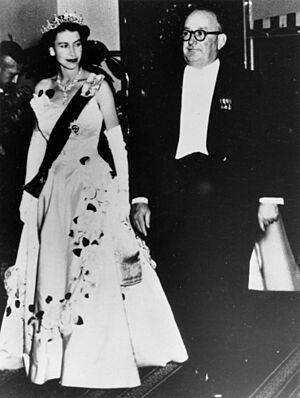
As Premier, Gair introduced several important changes for workers. These included improvements in worker's compensation, sick leave, and annual leave. He also brought in long-service leave. The government's control over prices helped workers in Queensland have some of the highest real wages in Australia.
However, Gair faced challenges with the AWU. In 1955, the AWU raised concerns about how land leases were being handled by the government. They claimed there might be unfair practices. Gair denied promising an investigation into these claims.
In 1956, a Senator named Ian Wood suggested that the government had asked for payments from landholders to extend their leases. He also claimed these payments went to the Labor Party. Gair quickly set up a special investigation. This investigation led to the Lands Minister, Tom Foley, being removed from his position and from the Labor Party. The investigation found that money had been improperly requested for party donations.
Gair easily won the state election in May 1956. Later, he had more disagreements with the union movement. One major issue was the introduction of three weeks of paid annual leave for workers. This had been a promise of the Labor Party since 1953. Gair initially said the state's finances did not allow for it, offering only extended long-service leave instead.
The unions and the party's executive body kept pushing Gair to introduce the three weeks' leave. Gair refused, believing the executive would not remove him. However, on April 24, the party executive expelled Gair. He left the Labor Party, taking 25 other politicians with him, including most of his Cabinet. They formed a new group called the Queensland Labor Party (QLP).
Gair tried to get support from other parties, but talks failed. On June 12, the remaining Labor Party members voted to stop funding Gair's government. This brought his government down. An election was called for August 3. Both the QLP and the Labor Party lost seats. The other parties formed a new government, and for the first time in 25 years, a Labor government was out of power in Queensland.
National Politics
Even though he was no longer Premier, Gair continued to lead the Queensland Labor Party. However, he lost his seat in the state election of 1960. In 1962, the QLP joined with the Democratic Labor Party (DLP).
In 1964, Gair was elected as a Senator for Queensland in the federal Parliament. He became the leader of the DLP, a position he held until 1973. In the Senate, he supported strong defense policies and was against Communism. Over time, his views on Communism became less common as world politics changed.
The "Gair Affair"
By 1973, Gair became unhappy with other DLP senators, and they asked him to step down as leader. In 1974, the federal Labor government, led by Prime Minister Gough Whitlam, wanted to gain more control in the Senate. Whitlam offered Gair the job of Ambassador to Ireland. Gair accepted this offer.
Whitlam planned for Gair to resign from the Senate at a specific time. This would create an extra Senate vacancy in Queensland, giving Labor a better chance to win more seats. However, when the plan became known, other political parties were upset. The Queensland Premier, Joh Bjelke-Petersen, acted quickly to prevent Whitlam's plan.
In Canberra, some senators from another party kept Gair busy, away from the person he needed to give his resignation to. They did this until 6 PM, which was the deadline for issuing election documents. Just after 6 PM, the Queensland government issued the documents for the usual number of Senate vacancies, not the extra one Whitlam had hoped for. This prevented Whitlam's plan from working. This event became known as "the Night of the Long Prawns." Gair later said he knew what was happening. This event helped lead to a new federal election. After the election, the Labor Party still did not control the Senate. The 1974 election also marked the end of the DLP as a major political force.
Later Life and Legacy
Gair took up his role as Ambassador to Ireland. During his time there, he had some disagreements with the Irish government and other ambassadors. He was recalled from his position in January 1976 because he was considered unsuitable for diplomacy.
Gair returned to Brisbane and passed away on November 11, 1980, at the age of 79. He was given a state funeral and buried in Nudgee Cemetery.
Gair Park in Dutton Park, Brisbane, is named after Gair. It is a special garden with a memorial, which first opened in 1951.
See also
- Australian Labor Party split of 1955
- 1975 Australian constitutional crisis
 | Madam C. J. Walker |
 | Janet Emerson Bashen |
 | Annie Turnbo Malone |
 | Maggie L. Walker |


